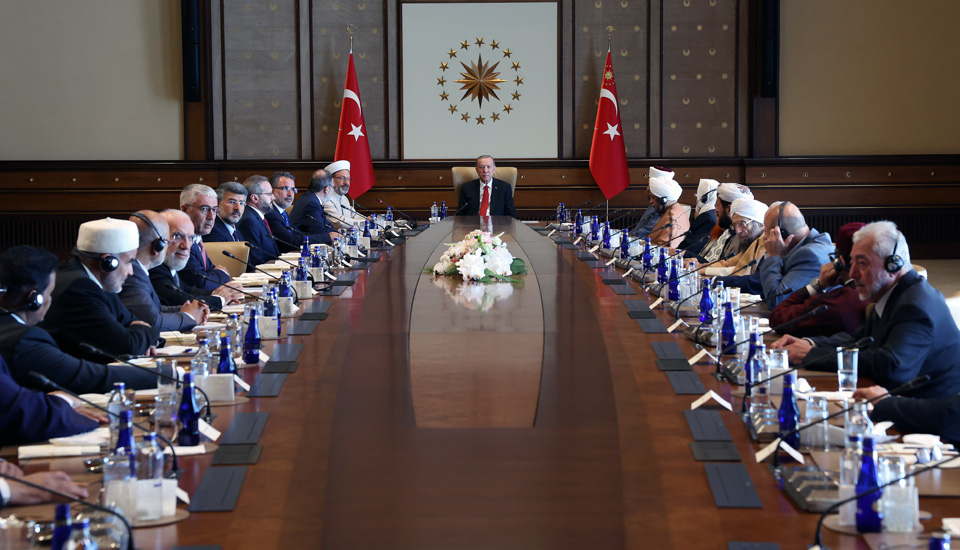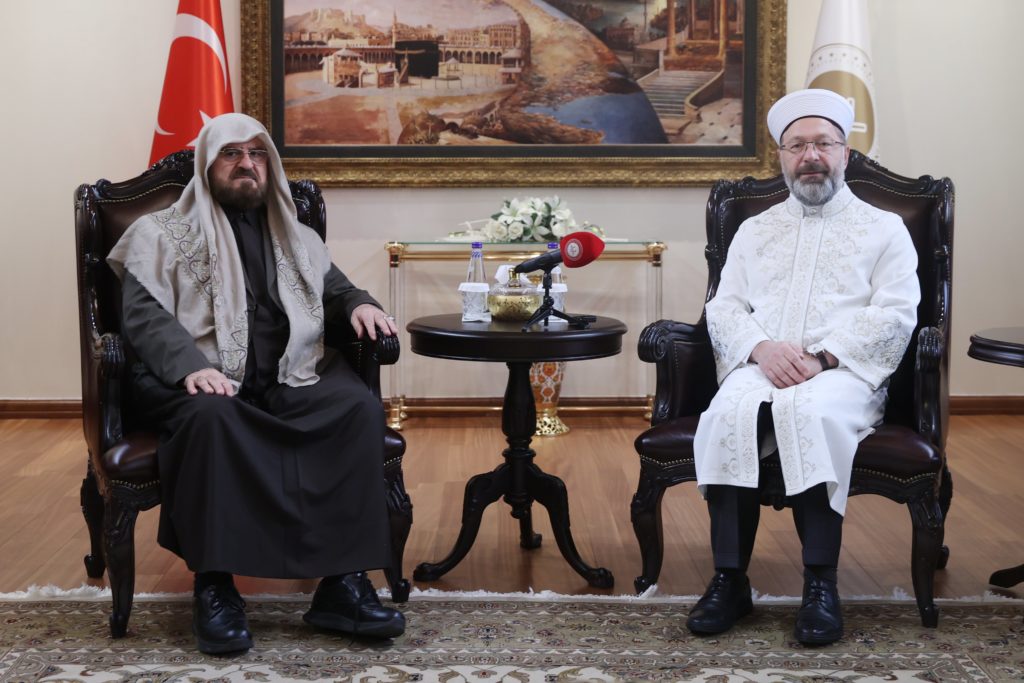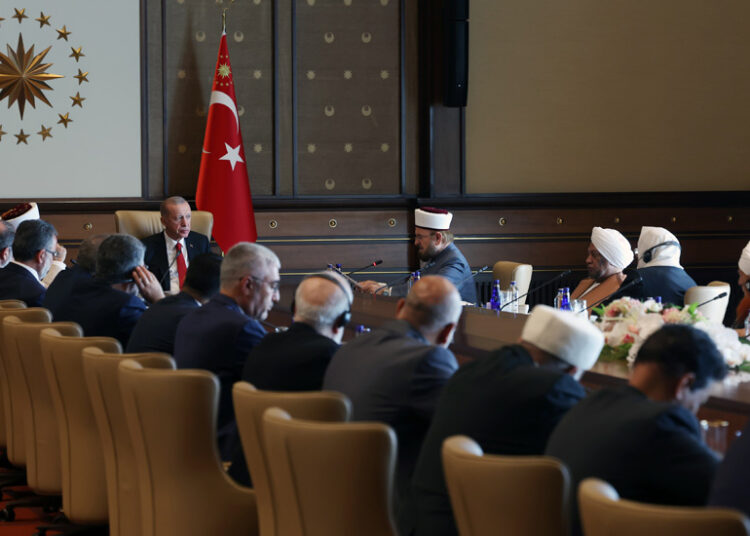Levent Kenez/Stockholm
The International Union of Muslim Scholars (IUMS), a Qatar-based Islamic organization with ideological ties to the Muslim Brotherhood and known for its close cooperation with Turkish President Recep Tayyip Erdogan, issued a wide-ranging religious decree on April 4 urging Muslim nations to mobilize militarily and economically in defense of Gaza.
During a public reading of the fatwa, IUMS President Ali al-Qaradaghi (also known in Turkey as Ali Karadaği) declared that the situation in Gaza had reached the level of genocide and that failure by Islamic governments to act was tantamount to complicity. “The failure of Arab and Islamic governments to support Gaza while it is being destroyed is considered by Islamic law to be a major crime against our oppressed brothers in Gaza,” al-Qaradaghi said.
The ruling outlines several forms of intervention deemed obligatory under Islamic law, including military support for Palestinian resistance factions, full-scale economic embargoes on Israel and the formation of an Islamic military coalition. The document explicitly forbids Muslim countries from supplying Israel with any resources such as oil and gas that could contribute to the military campaign in Gaza.
“It is forbidden to support the infidel enemy in its extermination of Muslims in Gaza, regardless of the type of support,” al-Qaradaghi said, reinforcing the fatwa’s strict interpretation of religious duty in the face of ongoing violence.
The fatwa also calls for the diplomatic isolation of Israel, urging the withdrawal of ambassadors, the imposing of political sanctions and a boycott of Israeli products. Additionally, Muslim communities in Western countries were encouraged to pressure their governments to cease support for Israel, with a particular focus on the United States.
Text of the fatwa, an opinion on Islamic law, issued by the IUMS regarding Gaza:
Turkey, along with Qatar, remains one of the IUMS’s key state supporters, offering political protection, diplomatic cover and financial assistance. Al-Qaradaghi has frequently appeared at Turkish government events and enjoys VIP status at religious and political gatherings. The Erdogan administration thus provides the IUMS with an important platform at a time when the organization faces regional isolation from several Muslim countries including Egypt and Saudi Arabia.
On August 8, 2023, President Erdogan received a delegation from the IUMS led by then-secretary-general al-Qaradaghi, along with Ali Erbaş, president of Turkey’s Directorate of Religious Affairs (Diyanet), and Prof. Dr. Mehmet Görmez, chair of the Institute of Islamic Thought and former head of the Diyanet.
Beyond personal ties, the IUMS has developed institutional relationships with the Diyanet, which manages more than 80,000 mosques domestically and abroad. The Diyanet employs around 140,000 people and plays a central role in shaping religious life across Turkish society.

Following al-Qaradaghi’s appointment as IUMS president on January 12, 2024, Erbaş published a congratulatory message filled with praise. “Our esteemed brother, Prof. Dr. Ali Muhyiddin al-Qaradaghi, has been elected as the president of the International Union of Muslim Scholars. I believe that his deep insight, accumulated knowledge and dedicated efforts will greatly contribute to the unity of the Islamic world and to global peace and stability,” Erbaş wrote. He concluded by offering prayers for al-Qaradaghi’s success in his new role.
The warm message reflected not only Erbaş’s personal endorsement but also the broader alignment between the Diyanet and the IUMS on religious and political matters. The two institutions have collaborated on various theological and ideological initiatives, often presenting a unified front on key issues affecting the Muslim world.
In the run-up to Turkey’s May 2023 presidential election, the IUMS issued a statement signed by 55 scholars from across the Islamic world, urging Muslims to vote for Erdogan. The declaration, which cited multiple Quranic verses, portrayed the election as a matter of global Islamic importance.
“Erdogan’s leadership has strengthened the rights and freedoms of Muslims in Turkey and beyond,” the statement read. It highlighted his role in lifting bans on the Islamic headscarf, expanding Quranic education and restoring Islamic values in public life. The scholars further claimed that under Erdogan’s rule, Turkey has emerged as a regional power, achieving breakthroughs in health, defense and technology — including the production of drones, electric vehicles and even an aircraft carrier.
The message, which some observers believed to be written with input from Erdogan’s office, was widely circulated.

Support from the IUMS has continued well beyond the election. On May 15, 2024, the organization issued another statement expressing approval of Erdogan’s refusal to label Hamas a terrorist group.
Most recently Ali Muhammad al-Sallabi, the IUMS’s current secretary-general, offered a public prayer for Erdogan after the overthrow of former Syrian president Bashar al-Assad on December 9, 2024. “President Erdogan is a divine blessing for the Turkish nation and oppressed people around the world,” he said.
The IUMS continues to promote pan-Islamic solidarity, positioning itself as a defender of oppressed Muslims and aligning closely with Erdogan’s foreign policy agenda. As regional power dynamics shift and Turkey deepens relations with Gulf countries that oppose the Muslim Brotherhood, Erdogan’s sustained engagement with the IUMS signals his enduring commitment to this ideological current.
However, opposition groups in Turkey including some Islamist organizations have criticized Erdogan for continuing his hardline rhetoric against Israel while failing to take concrete action. Among the most frequent points of criticism are the continued export of Turkish goods to Israel despite Ankara’s unilateral embargo and the flow of Azerbaijani oil to Israel through Turkish territory.












